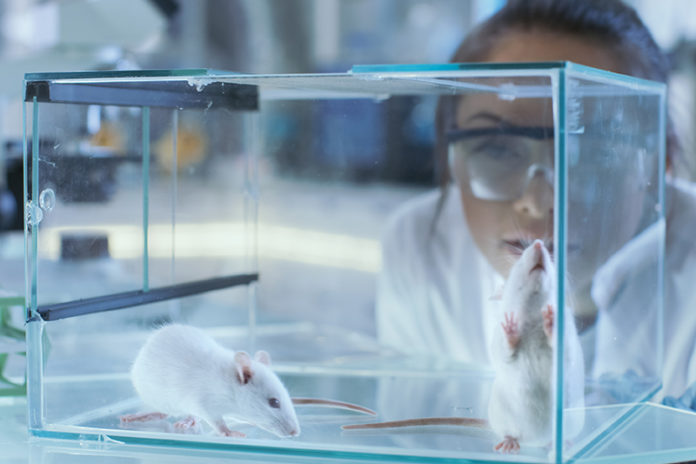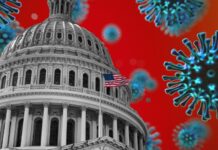(Washington, DC) – Judicial Watch announced that it received 699 pages of records from the Department of Health and Human Services (HHS) regarding data Moderna submitted to the Food and Drug Administration (FDA) on its mRNA COVID-19 vaccine, which indicate a “statistically significant” number of rats were born with skeletal deformations after their mothers were injected with the vaccine. The documents also reveal Moderna elected not to conduct a number of standard pharmacological studies on the laboratory test animals.
Judicial Watch obtained the records through a September 2021 Freedom of Information Act (FOIA) lawsuit filed after the FDA, the Centers for Disease Control and Prevention (CDC) and the National Institute for Allergy and Infectious Disease (NIAID) failed to respond to a June 2021, FOIA request biodistribution studies and related data for the Pfizer, Moderna and Johnson& Johnson COVID vaccines (Judicial Watch v. U.S. Department of Health and Human Services (No. 1:21-cv-02418)).
The records include a “Nonclinical Overview” prepared by Moderna and submitted to the FDA for approval of its vaccine revealing that a number of rats were born with skeletal deformations, known as “wavy ribs” and “rib nodules,” to mothers injected with the mRNA vaccine. The study dismissed the anomalies as “not considered adverse:”
mRNA-1273-related variations in skeletal examination included statistically significant increases in the number of F1 rats with 1 or more wavy ribs and 1 or more rib nodules. Wavy ribs appeared in 6 fetuses and 4 litters with a fetal prevalence of 4.03% and a litter prevalence of 18.2%. Rib nodules appeared in 5 of those 6 fetuses. Skeletal variations are structural changes that do not impact development or function of a developing embryo, are considered reversible, and often correlate with maternal toxicity and/or lack of other indicators of developmental toxicity (Carney and Kimmel 2007). Maternal toxicity in the form of clinical observations was observed for 5 days following the last dose (GD 13), correlating with the most sensitive period for rib development in rats (GDs 14 to 17). Furthermore, there were no other indicators of mRNA-1273-related developmental toxicity observed, including delayed ossification; therefore, these common skeletal variations were not considered adverse.
(Non-adverse deformations receive a different perspective in the July 2009 Environmental Researcharticle, “Dose–response relationships of rat fetal skeleton variations: Relevance for risk assessment:”
(Whether or not a substance-induced increase in the incidence of fetal skeleton variations should be taken into account for human risk assessment is a long-standing controversial issue. It has been argued that chemical-produced increases in variations are not to be considered for risk assessment because they are “unlikely to adversely affect survival or health.” The counter argument is that even not being overtly adverse and conveying no apparent selective disadvantage, a treatment-induced increase in the occurrence of variations means that the chemical agent has the potential to perturb skeleton development. According to this view, under a different condition of exposure, or in another species, this perturbation of normal bone formation may give rise to a different and more severe outcome.))
A “Pharmacokinetics Written Summary” marked “Confidential,” indicates that the information it contains is related to the mRNA-1273 (Moderna vaccine) strain, however, much of the data comes from work with mRNA-1647. The study states:
The results of a biodistribution study of mRNA-1647 support the development of mRNA-1273.
***
The biodistribution of mRNA-1647 was evaluated in a non-Good Laboratory Practice (GLP), single-dose, intramuscular (IM) injection study in Sprague Dawley rats…. mRNAs that are within an LNP of the same composition (e.g., mRNA-1273 and mRNA-1647) are expected to distribute similarly.
The “Summary” indicates:
- No absorption studies with mRNA-1273 [used in Moderna’s COVID vaccine] have been performed.
- No metabolism studies with mRNA-1273 have been performed.
- No excretion studies with mRNA-1273 have been performed.
- No PK [pharmacokinetic] studies with mRNA-1273 have been performed.
- No other PK studies with mRNA-1273 have been performed.
(According to PubMed.gov, “Pharmacokinetics studies are performed to clarify the absorption, distribution, metabolism, and excretion of drug candidates…[and] are required for establishing the efficacy and safety in humans.”)
A separate study submitted to the FDA sponsored by Moderna Therapeutics Inc. and conducted by Charles River Laboratories in Montreal, Canada is titled “A Single Dose Intramuscular Injection Tissue Distribution Study of mRNA-1647 in Male Sprague-Dawley Rats” in which “[t]he objective … was to determine the tissue distribution of mRNA-1647,” as opposed to mRNA-1273 used in Moderna’s COVID vaccine.
In one appendix to the study, a “clarification” was issued in the toxicokinetic report regarding the half-life of mRNA injected into the rats, noting: “The average value of terminal half-life for the muscle (i.e. injection site) in Sections 4.2 and 5 of the toxicokinetic report should be read 14.9 [hours] instead of 8.39 [hours] based on the results of the toxicokinetic evaluation.”
The study further notes that the wording of the conclusion was modified to read, “The half-life … of mRNA-1647 was reliably estimated in muscle (site of injection), proximal popliteal and axillary distal lymph nodes, and spleen with average values for all construct t½ [half-life] of 14.9 8.39, 34.8, 31.1 and 63.0 hours, respectively.” [Emphasis in original]
Another appendix, titled “Summary Mean (±SE) mRNA-1647 Pharmacokinetic Parameters in Sprague-Dawley Rat in Plasma and Tissues Following 100μg Intramuscular Injection Administration of mRNA-1647 on Day 1,” reveals that, in addition to distributing to the muscle site, lymph nodes and spleen, the mRNA particles also distributed to the bone marrow, brain, eyes, heart, liver, lungs, stomach and testes.
A separate study indicates that the mRNA-1647 particles injected into rats were “observed in muscle (i.e. site of injection), followed by proximal (popliteal) lymph nodes, axillary lymph nodes and spleen, suggesting the mRNA-1647 distribution to the circulation by lymph flow.” (The mRNA was delivered via “lipid nanoparticle dispersion.”)
“These previously hidden records about the COVID-19 vaccine safety and efficacy studies raise a number of disturbing questions,” said Judicial Watch President Tom Fitton. “The fact that it has taken a federal lawsuit to get access to this material is yet another scandal.”
Through FOIA Judicial Watch has uncovered a substantial amount of information regarding COVID-19 issues:
- In October 2020, Judicial Watch received FDA records that detailed pressure for COVID-19 vaccine booster approval and use.
- NIH records revealed an FBI “inquiry” into the NIH’s controversial bat coronavirus grant tied to the Wuhan Institute of Virology. The records also show National Institute of Allergy and Infectious Diseases (NIAID) officials were concerned about “gain-of-function” research in China’s Wuhan Institute of Virology in 2016. The Fauci agency was also concerned about EcoHealth Alliance’slack of compliance with reporting rules and use of gain-of-function research in the NIH-funded research involving bat coronaviruses in Wuhan, China.
- HHS records revealed that from 2014 to 2019, $826,277 was given to the Wuhan Institute of Virology for bat coronavirus research by the NIAID.
- NIAID records showed that it gave nine China-related grants to EcoHealth Alliance to research coronavirus emergence in bats and was the NIH’s top issuer of grants to the Wuhan lab itself. The records also included an email from the vice director of the Wuhan Lab asking an NIH official for help finding disinfectants for decontamination of airtight suits and indoor surfaces.
- HHS records included an “urgent for Dr. Fauci ” email chain, citing ties between the Wuhan lab and the taxpayer-funded EcoHealth Alliance. The government emails also reported that the foundation of U.S. billionaire Bill Gates worked closely with the Chinese government to pave the way for Chinese-produced medications to be sold outside China and help “raise China’s voice of governance by placing representatives from China on important international counsels as high level commitment from China.”
- HHS records included a grant application for research involving the coronavirus that appears to describe “gain-of-function” research involving RNA extractions from bats, experiments on viruses, attempts to develop a chimeric virus and efforts to genetically manipulate the full-length bat SARSr-CoV WIV1 strain molecular clone.
- HHS records showed the State Department and NIAID knew immediately in January 2020 that China was withholding COVID data, which was hindering risk assessment and response by public health officials.
- University of Texas Medical Branch (UTMB) records show the former director of the Galveston National Laboratory at the University of Texas Medical Branch (UTMB), Dr. James W. Le Duc warned Chinese researchers at the Wuhan Institute of Virology of potential investigations into the COVID issue by Congress.
- HHS records regarding biodistribution studies and related data for the COVID-19 vaccines show a key component of the vaccines developed by Pfizer/BioNTech, lipid nanoparticles (LNPs), were found outside the injection site, mainly the liver, adrenal glands, spleen and ovaries of test animals, eight to 48 hours after injection.
- Records from the Federal Select Agent Program (FSAP) reveal safety lapses and violations at U.S. biosafety laboratories that conduct research on dangerous agents and toxins.
- HHS records include emails between National Institutes of Health (NIH) then-Director Francis Collins and Anthony Fauci, the director of National Institute of Allergy and Infectious Diseases (NIAID), about hydroxychloroquine and COVID-19.
- HHS records show that NIH officials tailored confidentiality forms to China’s terms and that the World Health Organization (WHO) conducted an unreleased, “strictly confidential” COVID-19 epidemiological analysis in January 2020.
- Fauci emails include his approval of a press release supportive of China’s response to the 2019 novel coronavirus.































